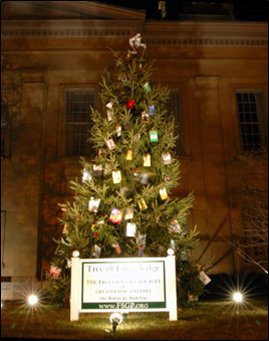Cutting Down the Tree of Knowledge
 Photo by andreykuzmin / 123RF
Photo by andreykuzmin / 123RF The ongoing saga for The Freethought Society to have the Tree of Knowledge—an evergreen tree decorated with atheist and freethought-themed books and a widely accepted symbol of the nontheist community—displayed alongside other theistic symbols at the winter holiday display in Chester County, Pennsylvania, has taken a turn for the worse. Just this past month, Commissioners Kathi Cozzone and Terence Farrell denied Margaret Downey, founder of The Freethought Society, and her permit application to place a Tree of Knowledge at the winter holiday display. The first year that the Tree of Knowledge was on display in 2007, it experienced eight incidents of vandalism; the second year, four incidents; the third year, none.
On first glance, it would appear as if this decision was made fairly recently, but this ordeal took root years ago. Philadelphia Examiner reporter Carol Roper wrote that, in 2010, former Commissioner Colin Hanna and leader of The Pastors’ Network didn’t bother to attend a meeting regarding an important resolution, as the office of the Chester County Commissioners found a way to keep nontheists from participating in the Winter Holiday community event and display. According to Secular News Daily, passing Resolution 58-10 would authorize Chester County to “acquire such holiday decorations and displays and erect and maintain such decorations and displays as it determines appropriate on the grounds of the Chester County historic courthouse consistent with and as otherwise constitutionally permitted by applicable law.” When Resolution 58-10 was passed by a vote of 2-1 on November 18, 2010, the progress that was made in increasing tolerance, understanding and acceptance ground to an abrupt halt. In place of inclusion and celebration of diversity within the community came the sole authorization of the Commissioners to make a determination which displays would be permitted.

The Freethought Society’s Tree of Knowledge
Although Resolution 58-10 conforms to the guidelines written in the 1984 United States Supreme Court case Lynch v. Donnelly, if Chester County follows them in the most restrictive way possible, it would also imply that the nontheist community will be prone to an exceptionally demeaning representation. I personally wrote to Commissioners Cozzone and Farrell over a month ago to express my concerns that symbols such as plastic candy canes or Santa Claus displayed to fulfill the minimal legal requirement for a “nontheistic balance” do not provide a meaningful representation of the nontheistic community, and that the consideration to display a Christmas tree, Crèche and Hanukah Menorah didn’t provide equal consideration or opportunity for our Buddhist friends to commemorate Rohatsu, HumanLight for humanists, or Pancha Ganapati for Hindus.
For the Chester County commissioners to deny the application of the Tree of Knowledge relegates the nontheistic community yet again to second-class status. I wrote again to Commissioners Cozzone and Farrell on December 1 with my concerns and respectfully requested that the Commissioners either reconsider the application for the Tree of Knowledge, or if they were to continue with their rejection of the application, to provide both Downey and me with a reason. Neither Cozzone nor Farrell responded to my emailed inquiry for comment.
The Commissioners have failed to recognize that the symbolic Tree of Knowledge isn’t about some knowledge of good and evil as is described in the Hebrew Bible (Genesis 2:17: “But you must not eat from the tree of the knowledge of good and evil, for when you eat from it you will surely die”). To have the Tree of Knowledge isn’t a step towards destruction of a community. Rather, it is a broad-reaching celebration of the knowledge of human endeavors over the years through science, art, literature, the humanities, engineering, and civics, among other things. To favor a couple of theistic symbols in the winter holiday display is an affront to the diverse demographics of people with sincerely held beliefs who call Chester County their home, as it sends out a message of exclusion during a season of inclusion.
